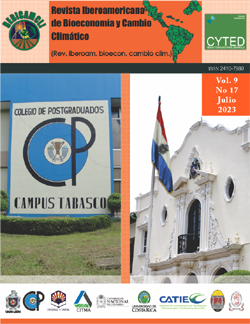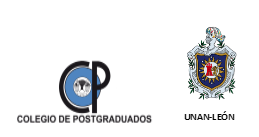Implementation of Quality in Testing Laboratories (ISO/IEC 17025:2017)
DOI:
https://doi.org/10.5377/ribcc.v9i17.15150Keywords:
quality in testing laboratories, risk management, system LIMS, lab settingAbstract
The research aims to briefly describe how to implement the requirements established in the ISO/IEC 17025:2017 standard, for the competence of quality testing laboratories, highlighting the context of the Laboratory and the basic elements of risk according to the guidelines. of the ISO 31000:2018 standard. It begins with a historical review of the evolution of quality and its importance in testing laboratories, describing the basic components of the laboratory context, emphasizing external and internal factors. The necessary aspects of risk management summarized through a flowchart are addressed, highlighting risk identification, analysis, assessment and treatment. Then a brief description of the requirements for competitiveness of laboratories is made, prioritizing the process approach and risk management that is explicitly found throughout the content of the standard. Finally, the importance of using the Laboratory Information Management System (LIMS) and artificial intelligence is discussed, as a tool to guarantee productivity and quality in customer results.
Downloads
2338
HTML (Español (España)) 0
References
G. Delgado, (2009), Sistema de la Calidad en Laboratorios de Ensayos, Universitas, Vol. 3, No. 2, pag. 5-13. https://doi.org/10.5377/universitas.v3i2.1660
DEMING E., (2000), "Out of the Crisis". First MIT Press Edition, Massachussets, pag. 18
JAMES P., (2001), Gestión de la Calidad Total, Prentice Hall, España. Pag. 45.
JURAN J.M., GRYNA F.M., (1998), Análisis y planeación de la calidad, 3a Ed., McGraw Hill, México, pag. 150.
ISHIKAWA, K., (1976)," Guía para el control de la Calidad", Organización Asiática para la Publicidad, pag. 214.
ISO/IEC 17020:2012, "Requisitos para Organismos de Inspección", Norma Internacional, Ginebra.
ISO 9001:2015 (Es), "Sistemas de Gestión de la Calidad-Requisitos". Norma Internacional, Ginebra.
a) ISO/IEC 17025: 2017 (Es), "Requisitos Generales para la Competencia de los Laboratorios de Ensayo y de Calibración", Norma Internacional, 3ª Edición, Ginebra; b) DOC-ONA 10-09 Ver 5, Criterios Generales para la Evaluación y Acreditación, ONA, Nicaragua.
ISO 31000:2018 (Es), "Gestión del Riesgo (es)", Norma Internacional, Ginebra, Segunda Edición.
EURACHEM/CITAC, (2002), Guide to Quality in Analytical Chemistry.
ISO 17034:2016(es), "Requisitos Generales para la competencia de productores de referencia", Norma Internacional, Ginebra.
JCCM 200:2012. International Vocabulary of Metrology, VIM. pp.29
a) GUM/ISO 1995:2008, Guide for to the Expression of Uncertainty in Measurement (GUM), ISO, Ginebra.
JGCM 106:2012, Papel de la incertidumbre en la evaluación de la conformidad, 1ª edición en español (2015).
ILAC-G18:09/2019, Guideline on decision rules and Statements of Conformity, ILAC 2019
Laboratory Information Management System LIMS (2022).
Ham B, MaHam A., (2016), Analytical Chemistry, Wiley, Canada, Pag. 209.
ILAC-G18:12/2021, Guideline for describing scopes of accreditation, ILAC 2021.
ISO/IEC GUIDE 25:1990. General Requirements for the Competence of Calibration and Testing Laboratories.
ISO/IEC 17025:1999. General Requirements for the Competence of Calibration and Testing Laboratories.
CENAM (2022), Centro Nacional de Metrología, Gobierno de Mexico.
NIST (2022), National Institute of Standard and Technology, Unite State of America http://ts.nist.gov/measurementservices/referencematerials/index.cfm
M. Solórzano. 2009. Elaboración de un material de referencia de cobre mediante el método primario de electrogravimetría a potencial controlado. Tesis Licenciatura en Química, UNAN-León. Pag. 94.
Richter W. 1997. Primary methods of measurements in chemical analysis. Accred. Qual. Assur. 2:354-359. https://doi.org/10.1007/s007690050165
DOC-ONA-12-011 (2022) "Política Para la Validación de Métodos de Laboratorio de Ensayos y Calibración". Oficina Nacional de Acreditación (ONA), Nicaragua.
NATA, 2018, Validation and verification of quantitative and qualitative analysis. Australia 2018. Pag. 31.
G. Delgado, N. Hernández, C. Moreno. 2014. Evaluación de la homogeneidad de la muestra y estudio intralaboratorio de la precisión intermedia en la determinación de maní. Universitas, Vol 5(1), pp. 11-25. https://doi.org/10.5377/universitas.v5i1.1477
Diario Oficial de la Unión Europea 3.3.2010. Reglamento (UE) No 178/2010.
ILAC, International Organisation for Accreditation, https://ilac.org/ilac-mra-and-signatories/
Ávila W., Cabrales-Pardomo Y., Silva-Peña JL., Dominguez-Reyes A. (2018). "Preparación de materiales de referencia interna para la determinación de C, Mn y Si en aceros". Rev. Cubana Quím. Vol. 30, no.1, págs. 3-12.
Katteman G., Buydens L. 1993. Quality Control in Analytical Chemistry, John Wiley & Sons Inc. NY. pp.15
EURACHEM/CITAC, Quantifying Uncertainty in Analytical Chemistry, 3a edición, UK (2012).
Kimothi S.K., 2002. The Uncertainty of Measurements. American Society for Quality, Wisconsin pp. 218.
Wadsworth H., Stepheens K., Godfrey A. 2005. Métodos de Control de Calidad, 2ª edición, CECSA, pp. 221
ISO 5725-6, (1994), Accuracy, International Standard, 6.2.2.
Feinberg M. (1996). La Validation de Méthodes d'Analyse, MASSON, Paris, pp. 196.
Delgado G. (2009). "Metodología para la Implementación del método adaptativo de Monte Carlo en la evaluación de la incertidumbre", Universitas, Volumen 3, Número 2, vol 9, 22-32. https://doi.org/10.5377/universitas.v3i2.1662
Delgado G., Nagel B. (2008). Un Experimento sencillo para evaluar la Incertidumbre siguiendo la guia GUM ISO 1995 y utilizando el cálculo simbólico MAPLE 11.0, Universitas,Volumen 1, Número 2, pp.19-26 https://doi.org/10.5377/universitas.v2i1.1639
Blanch A.R. (2010). Biotecnología ambiental, aplicaciones de la biotecnología. http://economia.gencat.cat/web/.content/70_economia_catalana/arxius/ne-97-98_e_blanch.pdf
Thieman William J. y Palladino Michael A. (2010). Introducción a la Biotecnología, 2ª edición, Pearson education S.A. 2010, pp10-12.
Zapata-García D., Llauradó M. y Rauret G. Experience of implementing ISO 17025 for the acreditation of a university testing laboratory. Accred Qual Assur, (2007). 12:317-322, https://doi.org/10.1007/s00769-007-0274-5
Arsene Cecilia, Cucu Man Simona y Olariu Romeo Iulian. 2020. The Importance of the Laboratory Quality Managment System in the Academic Curriculum in Developing Appropiate Studens Competence for Our Current Societal Needs. Proceedings 2020, 55,7; https://doi.org/10.3390/proceedings2020055007
Published
How to Cite
License
Copyright (c) 2023 Rev. iberoam. bioecon. cambio clim.

This work is licensed under a Creative Commons Attribution-NonCommercial-ShareAlike 4.0 International License.
Copyright © Rev. iberoam. bioecon. climate change (Graduate School and UNAN-León, School of Agricultural and Veterinary Sciences / Department of Agroecology / Center for Research in Bioeconomy and Climate Cahnge (CRByCC).







